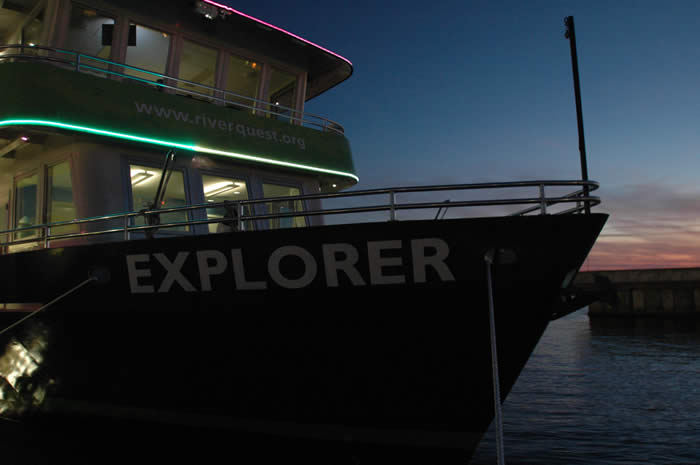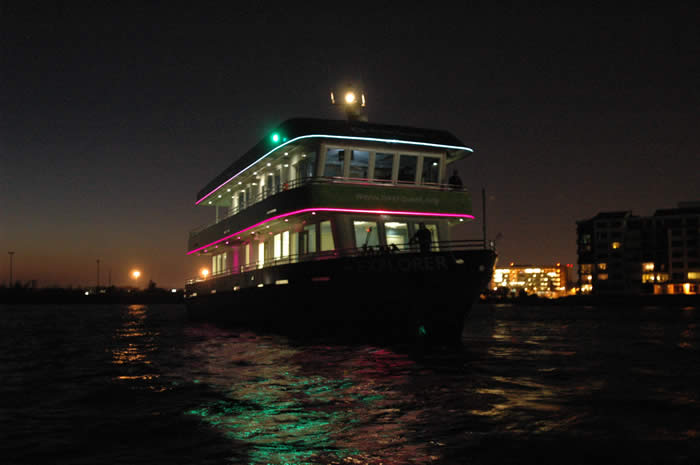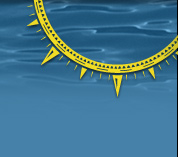
RiverQuestion of the Month
for September 2008

Question:
What makes Explorer a
“green” boat?
Answer:
RiverQuest recently welcome the new green vessel Explorer to Pittsburgh as its flagship. Explorer is called a “green” boat because it is designed to minimize its impact on the environment, both in the way it has been built and in the way it will operate. This 150-passenger, 90-foot boat is the first boat in the world to be designed in accordance with the US Green Building Council’s Leadership in Energy and Environmental Design (LEED) guidelines – what defines the green buildings in Pittsburgh. While LEED ratings do not exist for boats, a lot of a boat's construction and operation is very much like that of a building.
Boat propulsion systems are the greatest source of marine pollution – each marine vessel is basically a little power plant that produces its own electrical and mechanical power. Explorer features the world’s first commercial diesel-electric battery powered hybrid propulsion systems, known as the Siemens ELFA system.

Explorer has many green features:
- The hull is made out of 100% recycled steel.
- The interior and exterior is finished with the latest low VOC (volatile organic compound-emitting) paints and coatings from Sherwin- Williams, and high recycled content carpeting from Shaw.
- Highly efficient interior and exterior lighting systems are used, including fiberoptic deck lights from Fiberstar.
- Double-glazed TRACO windows provide 3 times the thermal insulation than traditional single-paned marine windows.
- Water management systems and zero wastewater discharge keep us from contributing to combined sewer overflow (CSO) problems. Low flow toilets, sinks, and waterless urinals are all part of this system to reduce wastewater by an estimated 80,000 gallons per year.
- Cabinetry and walls are fabricated from Dow's WoodStalk, a particle-board material composed of wheat straw--a highly renewable product that would ordinarily be burned as a by-product of agriculture. This product uses low VOC polymer binders instead of traditional formaldehyde based glues, reducing the out-gassing of noxious chemical and improving interior air quality.
- Environmentally friendly products were chosen for durable wall, counter and floor coverings. Trespa counter and wall surfaces are made of a quickly renewable softwood, and originate less than 500 miles from the shipyard where the boat was built. Forbo flooring and Mohawk wooden doors have high post-industrial recycled content.
- The Carrier air-conditioning system controls interior temperatures over a wider range of temperatures than would be found in a building air conditioning system. Fabric Duct Socks are used in place of metal or plastic air ducts. These are lightweight, reuseable, distribute heated or cooled air evenly, and can be washed to remove dust--improving the interior air quality.
- A ship-wide energy management and control system tracks our energy use.
- Daily operations replace paper towels with washable microfiber cloths for cleaning, and ammonia-based cleaners with biodegradeable peroxide based solutions. Aluminum, plastic, glass, paper and cardboard recycling are in place on RiverQuest vessels and in offices.
- The hybrid propulsion system will run on a biodiesel mixture, and thanks to the PA Department of Environmental Protection’s Energy Harvest program, we will also be adding 1.5 KW solar arrays to the boat’s roof and to our docks to charge our batteries at some point in the near future. The hybrid propulsion system will allow us to significantly reduce the boat’s energy needs on a per passenger basis and reduce greenhouse gases and cancer-causing diesel particulates.
Find Out More:
For more details, check out the fact sheets posted on our homepage. Click here.
For more information on what makes a building green, check out the website of Pittsburgh-based Green Building Alliance.
Explorer photos courtesy Pittsburgh Tribune Review.
<< Back to RiverQuest Homepage
|



